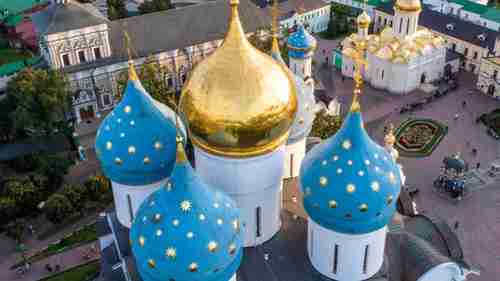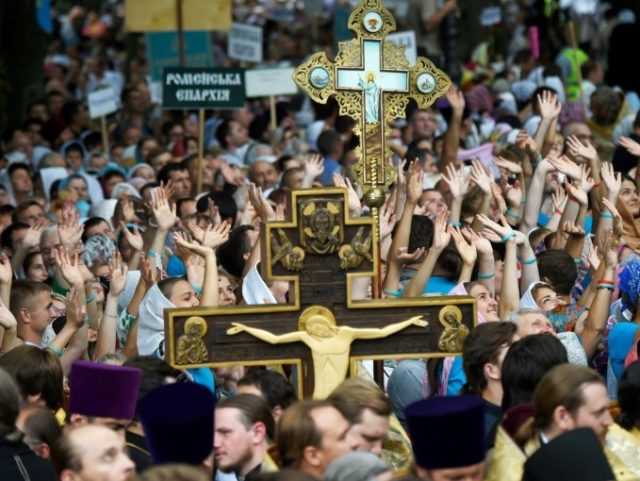This morning’s key headlines from GenerationalDynamics.com
- Russian Orthodox Church in historic split with Constantinople over Ukraine issue
- Consequences of an independent Ukrainian Orthodox Church
Russian Orthodox Church in historic split with Constantinople over Ukraine issue

Putin’s dream of an ‘Orthodox Vatican’ would be a major tourist and religious center in the city of Sergiev Posad, northeast of Moscow (BBC)
The Russian Orthodox Church (ROC) has taken the first steps in what is being described as a “historic schism” in the Orthodox Christian Church.
The ROC announced on Friday:
We have decided to suspend joint performance of church services with the hierarchs of the Constantinople Patriarchate, to suspend our membership in all structures, which are headed or co-chaired by the representatives of Constantinople.
An ROC spokesman said that this was only a “warning,” and that the ROC would break all relations with Constantinople if it grants independence to the Ukrainian Orthodox Church, which is currently subordinate to the Russian Church.
The Constantinople Patriarchate and the Moscow Patriarchate are two of several dozen Orthodox Patriarchates in the world, but they’re the two most influential.
The city of Constantinople was renamed Istanbul when it was conquered by the Ottoman Muslims in 1453, bringing an end to the Byzantine Empire. However, the spiritual leader of the world’s Orthodox Christians is still considered to be the Constantinople Patriarchate. All Patriarchates are considered to be equal, but Constantinople is “first among equals.”
Orthodox Christians in Ukraine are officially part of the Russian Orthodox Church. There is a Ukrainian Orthodox Church of Kiev that was formed in the 1990s, but it’s not recognized by other Orthodox churches.
After Russia invaded Ukraine, and then invaded and annexed Crimea in 2014, there was a movement in Ukraine to make the Ukrainian Orthodox Church an “autocephalous church” or independent church. Instead of being subordinate to the Russian Church, the Ukrainian church would then be a peer to the Russian and Constantinople churches.
Right now, Patriarch Bartholomew I in Constantinople is leading a debate about whether he should issue what is called a “Tomos of autocephaly” (charter of independence), which would give the Ukraine church the independence that it wants. It is believed that Bartholomew favors doing so and that a decision will be reached by the end of the year. At that time, Patriarch Kirill in Moscow is expected to complete several all relations with Constantinople. Russia Today and Moscow Times and BBC Russian (Trans) and Telegraph (London)
Consequences of an independent Ukrainian Orthodox Church
Although the current split was triggered by the Ukrainian church’s request for independence, following Russia’s invasion, occupation and annexation of Crimea, the chances of a split between Russia and Constantinople have been growing for years, particularly since the collapse of the Soviet Union.
The Soviet Union was officially atheist. Nonetheless, during the time of the Soviet Union, there was one Russian Orthodox Church, and all Orthodox Christians in the Soviet Empire belonged to it. After the Soviet collapse in 1991, independent Orthodox churches were formed in Estonia and other former Soviet republics. Constantinople recognized the Estonian church as independent, resulting in enormous friction between Moscow and Constantinople.
Those disputes became even more prominent when Russia’s president Vladimir Putin came to power. Putin’s dream is that the Russian Patriarchate should replace the Constantinople Patriarchate as the “first among equals.” Furthermore, Putin dreamed of creating an “Orthodox Vatican” in the ancient city of Sergiev Posad, northeast of Moscow.
In line with this dream, Putin has been enticing, bribing and threatening various Orthodox churches to pledge loyalty to the Russian church, rather than the Constantinople church.
Putin’s dream sounds reasonable when you consider that the Russian church is the largest Orthodox Church in the world, in terms of numbers of members and parishes. However, if Ukraine becomes an independent church, then the Russian church will lose almost half its parishes, and that will be the end of Putin’s dream. It will also cost the Russian Patriarchate a great deal of money. It will also encourage other former Soviet republics, like Belarus and Georgia, to follow the same path.
So this pending decision by Bartholomew is far more than symbolic. It has major religious and geopolitical implications. Putin would certainly retaliate. He might retaliate in Ukraine with a renewed invasion. He might retaliate by trying to convince his new pal, Turkey’s president Recep Tayyip Erdogan, to take some action in the Phanar, the portion of Istanbul still occupied by the Constantinople Patriarchate. So Bartholomew’s decision, expected by the end of the year, should have major consequences. Jamestown and Moscow Times and BBC Russian (Trans) Window on Eurasia
Related Articles:
- Russia’s annexation of Crimea splits the Russian Orthodox Church (20-Mar-2014)
- Russian Duma goes after Protestant churches as ‘sects and cults’ (14-Dec-2015)
- Historic Orthodox Christian gathering in Crete exposes sharp divisions (20-Jun-2016)
KEYS: Generational Dynamics, Russia, Ukraine, Constantinople, Russian Orthodox Church, Ukrainian Orthodox Church, Patriarch Bartholomew I, Patriarch Kirill, Vladimir Putin, Sergiev Posad, Orthodox Vatican, Turkey, Recep Tayyip Erdogan, Estonia, Belarus, Georgia
Permanent web link to this article
Receive daily World View columns by e-mail

COMMENTS
Please let us know if you're having issues with commenting.